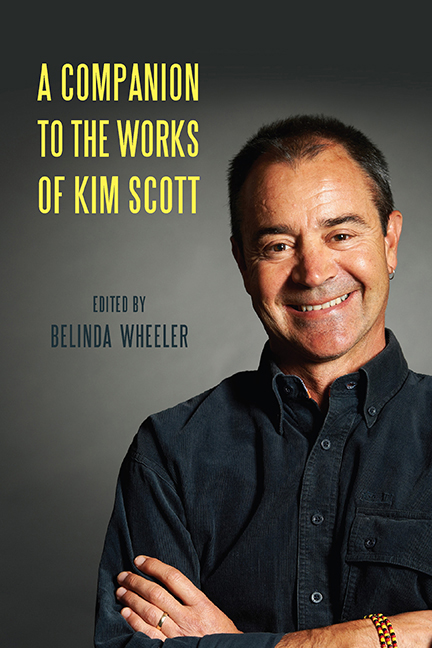Book contents
- Frontmatter
- Contents
- Foreword
- Acknowledgments
- Note on Orthography
- Chronology of Key Writings
- Introduction
- 1 Kim Scott’s Publishing History in Three Contexts: Australian Aboriginal, National, and International
- 2 Kim Scott’s True Country as Aboriginal Bildungsroman
- 3 The Land Holds All Things: Kim Scott’s Benang—A Guide to Postcolonial Spatiality
- 4 Kim Scott’s Kayang and Me: Noongar Identity and Evidence of Connection to Country
- 5 “Wreck/Con/Silly/Nation”: Mimicry, Strategic Essentialism, and the “Friendly Frontier” in Kim Scott’s That Deadman Dance
- 6 The International Reception of Kim Scott’s Works: A Case Study Featuring Benang
- 7 Traumatic Landscapes: Inscribing Spectrality and Identity in Kim Scott’s “A Refreshing Sleep,” “Capture,” and “An Intimate Act”
- 8 Spatial Poetics and the Uses of Ekphrasis in Kim Scott’s “Into the Light” and Other Stories
- 9 The Poetry of Kim Scott
- 10 The Wirlomin Project and Kim Scott: Empowering Regional Narratives in a Globalized World of Literature
- 11 Kim Scott as Boundary Rider: Exploring Possibilities and New Frontiers in Aboriginal Health
- 12 An Interview with Kim Scott
- Notes on the Contributors
- Index
12 - An Interview with Kim Scott
Published online by Cambridge University Press: 08 May 2021
- Frontmatter
- Contents
- Foreword
- Acknowledgments
- Note on Orthography
- Chronology of Key Writings
- Introduction
- 1 Kim Scott’s Publishing History in Three Contexts: Australian Aboriginal, National, and International
- 2 Kim Scott’s True Country as Aboriginal Bildungsroman
- 3 The Land Holds All Things: Kim Scott’s Benang—A Guide to Postcolonial Spatiality
- 4 Kim Scott’s Kayang and Me: Noongar Identity and Evidence of Connection to Country
- 5 “Wreck/Con/Silly/Nation”: Mimicry, Strategic Essentialism, and the “Friendly Frontier” in Kim Scott’s That Deadman Dance
- 6 The International Reception of Kim Scott’s Works: A Case Study Featuring Benang
- 7 Traumatic Landscapes: Inscribing Spectrality and Identity in Kim Scott’s “A Refreshing Sleep,” “Capture,” and “An Intimate Act”
- 8 Spatial Poetics and the Uses of Ekphrasis in Kim Scott’s “Into the Light” and Other Stories
- 9 The Poetry of Kim Scott
- 10 The Wirlomin Project and Kim Scott: Empowering Regional Narratives in a Globalized World of Literature
- 11 Kim Scott as Boundary Rider: Exploring Possibilities and New Frontiers in Aboriginal Health
- 12 An Interview with Kim Scott
- Notes on the Contributors
- Index
Summary
THIS ORIGINAL PHONE INTERVIEW took place on June 16, 2015.
BELINDA WHEELER (BW): Thank you for allowing me to interview you, Kim.
KIM SCOTT (KS): It's a pleasure.
BW: Since the Companion is discussing your oeuvre, I thought readers would find it more meaningful if we discussed a diverse range of topics.
KS: Sure.
BW: My first question relates to an earlier 1996 interview. In that interview you said that your audience was “yourself to some extent.” A lot has changed for you personally and professionally since then and I wanted to know, do you still picture yourself as the primary audience or do you picture a different audience when you are writing?
KS: That's a good question. I’m certainly much more aware of an audience now than I was then, and in fact I find that quite inhibiting in many ways. However, I think I still write—I try to write—for myself, really. I’m much more aware of a wider audience, but also that that audience is in reality rather small. Perhaps that's because I write to explore things, obsessions among other things. Perhaps it is because the audience for literature itself is diminishing. I’m reasonably aware of literary concerns, so in that sense I think I write for an audience more like myself… . It's difficult to answer.
BW: That's good, though, because maybe before it was more like you were focusing on yourself primarily. Today, as you’ve pointed out, you are more aware of your larger audience. The primary audience might still be you, but you are still conscious of that broader audience. Would that be fair?
KS: Yes. I am aware of the potential implications of what I write to a much greater extent than I had been before. Sometimes I find it hard to be brave enough to trust and believe in the creative process, and to be prepared to fly in the face of apparently strategic or more overt political concerns and so forth, in the interest of what you can do with a story that other forms of discourse don't allow.
- Type
- Chapter
- Information
- A Companion to the Works of Kim Scott , pp. 158 - 170Publisher: Boydell & BrewerPrint publication year: 2016



